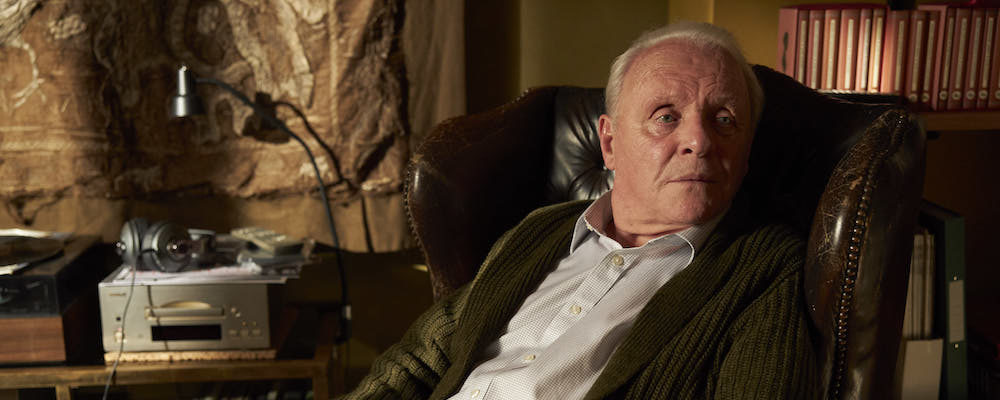‘The Father’: Anthony Hopkins Delivers a Performance of Tragic Force as a Man Gripped by Dementia
Alci Rengifo
In “The Father,” Anthony Hopkins becomes a heartbreaking portrait of a man feeling reality slip away. Hopkins joins other thespians of a certain age who have been exploring stories about dementia. It is a theme that allows for stories about the passage of time and twilight years spent forgetting the past and even present. Director Florian Zeller, making his directorial debut by adapting his own play, still finds a way to make this film striking by applying a new technique. Instead of looking at the plight of Hopkins’s character from afar, he designs the experience to make us feel his very disorientation.
Always with wandering eyes is Anthony (Hopkins), who at 80 is told by his daughter Anne (Olivia Colman) that she’s moving to Paris with a man she’s met. But then Anthony awakens the next day, only to discover he’s no longer in his flat, but living with his daughter, now played by Olivia Williams. Ah, but then reality snaps back into place with Colman’s Anne, who is actually still married to Paul (Rufus Sewell). Anne brings in one morning a possible new at-home caretaker, Laura (Imogen Poots), who is warned Anthony has already caused several other caretakers to leave. It’s not hard to see why. Anthony has a ferocious temper that he combines with some lingering wit and charm. He can be funny, and then spiral into a confused rage. If his watch goes missing he suspects theft, and he can’t seem to get names right anymore while obsessing over another daughter, an artist who was clearly his favorite, but who is missing from this picture. Anthony cannot keep a firm grip on anything that is going on, and we can’t be sure what’s real or a mixture of memory and the present.
“The Father” has an incredibly intricate yet elegant editing style by Yorgos Lamprinos that immerses us in Anthony’s fractured mental state. Recent dramas about parents with dementia, and the crucibles bared by their children, tend to take the offspring’s point of view. But here we are looking at the confined world of a London flat through Anthony’s eyes. The flat, a pristine example of the London middle class, becomes similar to spaces in Ingmar Bergman films in that it could very well represent the inside of Anthony’s brain. Scenes make sense within themselves then the whole idea seems fractured in the next moment. Anthony walks in on a man played by Mark Gatiss who claims to be Anne’s husband, but why is Anne now played by Olivia Williams? And why is it clear later that Rufus Sewell’s Paul is Anne’s actual husband? Anthony is convinced she’s moving to Paris, but she insists she’s not. There’s also a painting by Anthony’s beloved specter of the other daughter, which goes missing suddenly from the flat’s walls. This is what it must feel like to start losing the fabric of comprehension. Zeller’s dialogue captures the broken chatter and confused conversation Anthony brings out in everyone. He talks in a flood of half-formed or full thoughts, both like a mental traffic jam.
In a brilliant performance Anthony Hopkins turns this Anthony into a personality empathetic and unnerving. Anthony can have the charming qualities of humor and charisma, attempting a tap dance for Laura while practically doting on her because she reminds him of his artist daughter. Hopkins then seamlessly can transition into a sudden rage, insisting he will never leave his flat. Here he is a big personality now trapped in a frail body. Hopkins has of course played everything, from Hannibal Lecter to Richard Nixon, and it is quite a lesson in performance to see this master frighten and then make us feel pity. Like Lance Henriksen in “Falling,” another recent and memorable take on this very subject, Hopkins dominates the space by becoming intimidating through not having control over his senses. Anthony was obviously once a headstrong man, a proud engineer, yet not an unloving father. But now with his mind slipping away it’s as if both sides of him pour out. The other performances are on par with Hopkins. Olivia Colman is all frustrated empathy, loving Anthony but at her wits’ end. Rufus Sewell is also excellent as the husband annoyed with having to care for Anthony, quickly losing his temper at the old man’s comments, refusing to respond to it like symptoms of illness.
The final moments of “The Father” are some of the most moving Hopkins has ever performed. His rambled fusion of memories and real time perceptions crescendo to a heartbreaking revelation. Past hallucinations begin to make sense to us, the audience, or at least some of them, and we realize the haunting truth about where Anthony is truly living. Zeller has made a unique and intricate drama that is all about dementia as a destroyer of time itself in the mind. More keenly, it’s also about how such an illness can lay bare the inner personality of someone. With little control over what he says or does, the real Anthony comes out. He may not be a monster, just flawed, like all people. In a sense his rages require to be understood instead of judged. What was once familiar now seems distorted through his eyes, and what he believes happened one day probably never did. This film brilliantly evokes that condition like few other dramas on the subject.
“The Father” releases Feb. 26 in select cities and March 12 on VOD.

